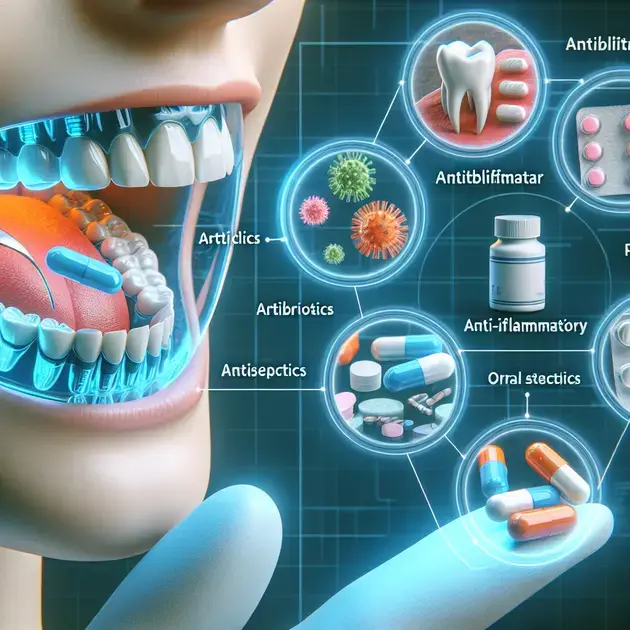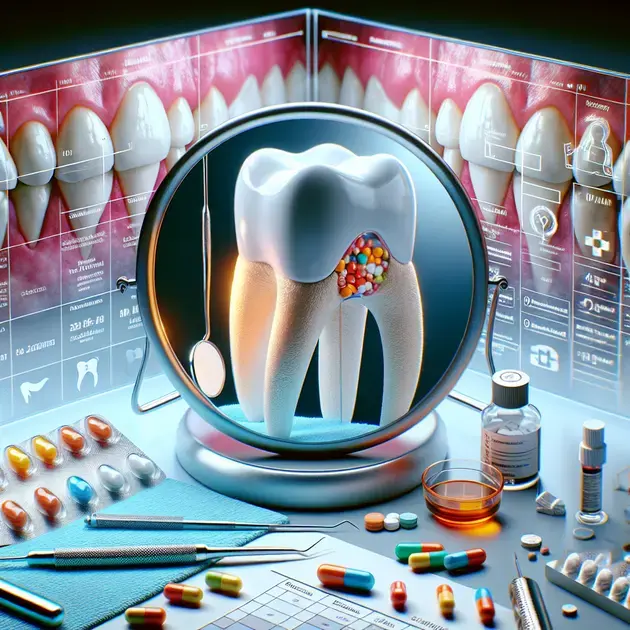Looking for the most effective medication for periodontitis? You’ve come to the right place. In this comprehensive guide, we will explore the latest advancements in treating this common gum disease.
Periodontitis can lead to serious complications if left untreated, making it crucial to find the right treatment. From antibiotics to deep cleaning procedures, understanding the options available can make a significant impact on your oral health. Let’s dive into the world of medications for periodontitis.

Finding the Best Medication for Periodontitis
Periodontitis is a serious condition that requires proper medication to effectively treat. When searching for the best medication for periodontitis, it’s important to consult with a dental professional for personalized recommendations. One common medication prescribed for periodontitis is antibiotics, such as doxycycline or minocycline. These antibiotics can help reduce the bacteria causing the infection and promote healing.
Another medication often used for periodontitis treatment is antimicrobial mouth rinses, like chlorhexidine. These rinses can help reduce plaque and prevent the progression of the disease. It’s essential to follow the instructions provided by your dentist or healthcare provider when using these medications to ensure efficacy.
For more severe cases of periodontitis, surgical interventions may be necessary. These can include flap surgery to reduce the pocket size between the teeth and gums, as well as bone or tissue grafts to help regenerate lost bone or gum tissue. Your dentist will recommend the best course of action based on the severity of your condition.
When looking for the best medication for periodontitis, be sure to consider any potential side effects and interactions with other medications. It’s important to inform your healthcare provider of any existing medical conditions or allergies before starting treatment.
Overall, finding the best medication for periodontitis involves a personalized approach in consultation with a dental professional. By following their recommendations and maintaining good oral hygiene practices, you can effectively manage and treat this condition.
The Importance of Treating Periodontitis
Treating periodontitis is crucial for maintaining oral health and preventing further complications. Untreated periodontitis can lead to tooth loss, bone deterioration, and even systemic health issues like heart disease and diabetes. By addressing periodontitis promptly, you can avoid these potential consequences and preserve your overall well-being.
Proper treatment of periodontitis also helps improve the appearance of your smile and boost your confidence. Gum inflammation and recession caused by periodontitis can negatively impact the aesthetics of your teeth and gums. By undergoing treatment, you can restore the health and beauty of your smile.
Furthermore, treating periodontitis can enhance your quality of life by reducing discomfort and pain associated with the condition. Chronic gum inflammation and infection can cause significant oral discomfort, affecting your ability to eat, speak, and enjoy daily activities. Effective treatment can alleviate these symptoms and improve your overall comfort.
Additionally, addressing periodontitis can prevent the need for more extensive and costly dental procedures in the future. By taking proactive steps to treat this condition early on, you can avoid the potential need for tooth extractions, gum surgeries, and other invasive treatments down the line.
In conclusion, the importance of treating periodontitis cannot be overstated. By seeking timely and appropriate care for this condition, you can safeguard your oral health, overall well-being, and quality of life. Don’t hesitate to consult with your dentist or periodontist to develop a treatment plan that meets your needs and ensures long-term oral health.
Exploring Treatment Options for Periodontitis
When exploring treatment options for periodontitis, it’s essential to consider both nonsurgical and surgical interventions based on the severity of the condition. Nonsurgical treatments may include scaling and root planing, a deep cleaning procedure that removes plaque and tartar from the root surfaces of the teeth.
Another nonsurgical option for periodontitis treatment is the use of locally administered antimicrobials, such as Arestin. This antibiotic powder is placed directly into the periodontal pockets to target and eliminate the bacteria causing the infection. Your dentist can determine if this treatment is appropriate for your individual needs.
In cases where nonsurgical methods are insufficient, surgical interventions may be recommended. These can include flap surgery to reduce pocket depth, bone or tissue grafts to regenerate lost structures, and guided tissue regeneration to promote new bone growth. Your periodontist will assess your condition and recommend the most suitable surgical approach.
In addition to professional treatments, maintaining good oral hygiene practices at home is essential for managing periodontitis. This includes brushing and flossing regularly, using antimicrobial mouth rinses as recommended, and attending regular dental check-ups for monitoring and maintenance.
Ultimately, exploring treatment options for periodontitis requires a comprehensive approach that addresses the underlying causes of the condition and aims to restore gum health. By working closely with your dental care team and following their guidance, you can effectively combat periodontitis and preserve the health of your gums and teeth.

**Effective Medication Management Strategies for Periodontitis**
Introduction
Periodontitis is a chronic inflammatory disease that affects the gums and supporting structures of the teeth. It is crucial to effectively manage this condition to prevent further progression and maintain oral health. In this article, we will explore some effective medication management strategies for periodontitis.
Antibiotics
Antibiotics play a significant role in managing periodontitis by targeting the bacteria responsible for the infection. Common antibiotics used include doxycycline and minocycline, which are often prescribed in combination with other treatments such as scaling and root planing.
Research has shown that the use of antibiotics can help reduce inflammation and improve clinical outcomes in patients with periodontitis. However, it is essential to use them judiciously, as overuse can lead to antibiotic resistance.
Patients should follow their dentist’s instructions carefully when taking antibiotics for periodontitis and complete the full course of treatment to ensure effectiveness.
Anti-Inflammatory Medications
Anti-inflammatory medications can help control the inflammation associated with periodontitis and reduce pain and swelling. Nonsteroidal anti-inflammatory drugs (NSAIDs) such as ibuprofen are commonly used to manage the symptoms of periodontal disease.
These medications work by inhibiting the production of prostaglandins, which are chemicals in the body that cause inflammation. By reducing inflammation, NSAIDs can help improve the overall health of the gums and prevent further damage to the teeth and supporting structures.
Patients with periodontitis should consult their dentist or healthcare provider before taking NSAIDs to ensure they are safe and appropriate for their individual condition.
Oral Antiseptics
Oral antiseptics are another essential part of medication management for periodontitis. These products contain antimicrobial agents that can help reduce the number of bacteria in the mouth and prevent infection.
Common oral antiseptics include chlorhexidine mouthwash, which is effective in controlling plaque and gingivitis. Patients with periodontitis may be advised to use an oral antiseptic as part of their daily oral hygiene routine to promote healing and prevent further complications.
It is essential to use oral antiseptics as directed by the dentist and to maintain good oral hygiene practices to maximize their effectiveness in managing periodontitis.
Conclusion
Effective medication management is crucial for combating periodontitis and maintaining optimal oral health. Antibiotics such as doxycycline and minocycline play a vital role in targeting the bacteria causing the infection, reducing inflammation, and enhancing clinical outcomes. However, judicious use and adherence to the prescribed treatment course are paramount to avoid antibiotic resistance.
Anti-inflammatory medications like NSAIDs offer relief by controlling inflammation, reducing pain, and swelling associated with periodontal disease. By inhibiting prostaglandin production, NSAIDs aid in improving gum health and preventing further dental complications. Patients must consult their healthcare providers before using NSAIDs to ensure safety and suitability for their individual condition.
Oral antiseptics, such as chlorhexidine mouthwash, are essential in reducing oral bacteria levels and preventing infections in patients with periodontitis. Incorporating oral antiseptics into daily oral hygiene routines can promote healing and mitigate complications. Adhering to dentist recommendations and maintaining good oral hygiene practices are key in maximizing the efficacy of oral antiseptics in managing periodontitis.



